Editor’s note: A version of this story first appeared in the Messenger, a periodical of the Church of the Brethren.
“I don't know what your destiny will be, but one thing I know: the only ones among you who will be really happy are those who have sought and found how to serve.” ― Albert Schweitzer
By Beverly Sayers ’69 Eikenberry
Maria Luisa never knew her father. He died before she was born. So, she cuddled at night with her mother. One night when she was 3 years old, her mother grabbed her and pushed her out the front door where she tumbled to the ground as men took her mother away. Three days later Maria Luisa’s mother was found dead in the street, one of 200,000 Mayan killed in the 36-year civil war in Guatemala. She was a baker. Her “crime” was selling bread to a perceived enemy.
Maria Luisa lived in extreme poverty with her grandmothers. Her uncles guarded her to assure that she brought no new mouths to feed into the family. She felt God had saved her that night for a purpose and her dream was to become a nurse. She had to endure Mayan resistance to education for girls. She had a husband, two children and a little one “in the oven” when she was ready for nurses training. She persisted with her husband’s help.
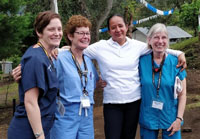 |
From left: Dr. Jessamine Hippensteel,
Dr. Rosalie McBride, Maria Luisa and
Rhonda Whitten |
By January 2020, Maria Luisa was keeping meticulous records of Mayan women who were willing to come for check-ups at local medical centers in the mountains. Dr. Rosalie Rouch McBride ’87, Dr. Jessamine Cutshall ’04 Hippensteel, and nurse midwife Rhonda Whitten, three of 13 health care providers on the Manchester University 2020 Medical Practicum, created three “private” rooms in a school classroom by hanging sheets for walls and draping tables for exams. Here they worked with Maria Luisa to serve hundreds of women, some who walked from villages with no roads.
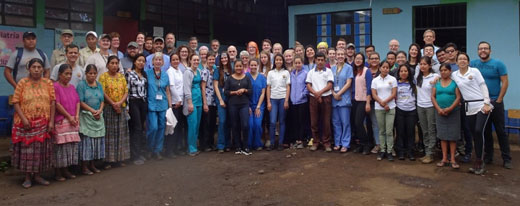
Medical Practicum 2020 in El Esfuerzo, Guatemala
Forty years ago, in 1981, the first Medical Practicum took students interested in health care professions to Guatemala, not in the mountains, but along the shores of Lake Izabal and under the direction of Edward Miller ’56, professor emeritus of chemistry. The group totaled 11: eight students, a physician, a dentist and Miller. Ed continued to take students and health care providers to locations in Panama, Honduras, Dominican Republic, and Costa Rica, ultimately focusing on Nicaragua for more than 10 years, where locations moved from Mulukukú to Santa María to Ciudad Antigua with directors Terese Salupo-Bryant, associate professor of chemistry, for two years and Julie Garber ’79 for three years. Jeff Osborne, professor of chemistry, has directed the Medical Practicum since 2008, moving Nicaraguan locations to the rivers Coco and Bocay. He returned the group to Guatemala in 2019.
In 2020 the Medical Practicum has grown to number 61, including cooks, students, translators, volunteers and health care professionals.
Over the 40 years, participants have included 429 students. Fifty-four percent of those students went on to become health care providers. Thirty-two have returned to serve as providers with the Medical Practicum in later years.
What makes this experience so valued that students continue to request to go and doctors pay their own way to go? After all, it is neither an easy, nor a comfortable, experience.
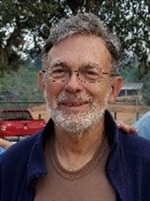
Bill Fike, M.D.
|
In 2020, when asked why he values the Medical Practicum experience, Dr. Bill Fike, a physician who has participated in the Medical Practicum for 14 years wrote: “Getting up at 3 a.m. (or not even having any sleep) to make the flight to Atlanta, then sit around for 8 hours before boarding the 3.5 hr. plane ride for Guatemala City (with no meal provided), then going through immigration and customs (more waiting), then to a conference center for some sleep, finally. Next day, a 5-hour bus ride to Purulhá and the following day 2 hours to El Esfuerzo where we set up clinic and arrange our bedrolls on the floor (which is dirty). [1,000 lbs.] of medicine and supply bags to load/unload several times. Eating variations of beans and rice with tortilla and coffee each meal. Why would a physician pay his own way to do this?” His answer: “To make a difference in another’s life. 50 years from now, no one will remember what kind of car we drove, or who we were, but rather by the difference we make in the life of a patient or student—that is our legacy.”
Ken Langdon, a retired physician assistant with four years of Medical Practicum experience, is doing as much as possible as long as possible because there is so much need. Dr. Hippensteel wants “to help others suffer less.” Dr. McBride says, “It feeds my soul” to help others who are less fortunate.
So why do the students come? Many of them want an experience in another country. Some have never been on an airplane before. Sam Kluesner ’20 Pharm.D., wanted an adventure in addition to helping others. Living without running water, bathing in a river or taking cold showers in makeshift plastic enclosures with mud floors, washing your clothes by hand, using latrines or learning to flush using a bucket – for most, these are new experiences. For the local people living in the areas being served, these activities are just their way of life.
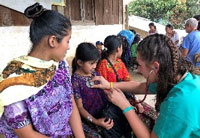 Guatemala 2019 student Karly Eichenaur
with Maya |
Almost all the participating students are interested in pursuing a career in the health professions. This experience allows them hands-on experience with real live medical professionals. They learn to take blood pressures and medical histories. They learn about diagnoses and treatment, about medications, and how to explain to patients the dosages and timing of medications. They learn about taking Pap smears, giving shots, and why pulling infected teeth can save lives. They watch physicians sew up machete wounds and treat bad burns. They are immersed in health care and often come away from a day’s experience concluding that for sure they will NOT pursue a specific line of medicine or that they LOVE what they did that day.
Helping students learn about the medical professions is motivation for all of the health care providers on the trip. They do this by becoming team members with students and translators to get everything done that needs to be done for the sake of the people they are serving. They eat together, see patients together, play together and, in the evenings, they meet together to reflect on the day and listen to the life stories of the providers. Wisdom and advice are rich.
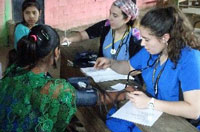
Guatemala 2020 students Emma Saunders, Vanessa Mahmoud |
Dr. Mark Shafer ’88, a dentist, says none of us gets to where we are alone. We are always recipients of help from others. Be grateful! Jason Isch, assistant professor of pharmacy practice at MU, wants students to not let others define them, but rather be true to their values as they make life decisions. Several share that all the challenging academic work to become a physician is worth it, that the hugs and jokes and listening to dreams of children are a joy, that being an OB/GYN doc is fun and an honor. Jeff Osborne, the chemistry professor who makes this January session trip possible, wants students to “Continue seeking ways to serve and how to serve in order to improve the human condition.”
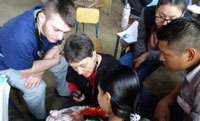
Guatemala 2020 student Zach Brazel
with Dr. Joy Cain
|
Because of Osborne’s desire to serve those with great need in a way that can be sustained, the Medical Practicum intentionally collaborates with local organizations that are working to improve life conditions. In 2019 and 2020 that organization was FUNDENOR, a small nonprofit doing balanced, holistic community development focusing on raising fowl, home gardening, nutrition, personal hygiene, women’s issues, and health. FUNDENOR provided translators from the Mayan languages of Q’eqchi’ and Pocomochi’ to Spanish and from Spanish to English to facilitate the medical work. They scheduled the Guatemalan-trained nurses, including María Luísa, to work with the Manchester University group.
Osborne understands the importance of WORKING WITH rather than DOING GOOD FOR, as we from outside a culture judge the “good.” One provider observed the difference between the way the Medical Practicum works with local organizations and “medical tourism.” The latter is designed to make the participant feel good about himself/herself. Comfort is a high priority. The Medical Practicum focuses on working together, to be more culturally sensitive and more effective. Osborne’s orientation materials include this quote:
“If you have come here to help me, you are wasting your time. But if you have come because your liberation is bound up with mine, then let us work together.” – Lilla Watson
Over its 40 years, the Medical Practicum has worked 10 years with local churches, 11 years with social/political organizations, 13 years with the Nicaraguan federal government, one year with a university, and most recently two years with a non-governmental nonprofit organization.
The trip does not happen without such amazing, generous providers, who not only pay their own way, but also take valuable time away from work, Osborne says. Financial sponsors have been key, including 94 individuals helping the 2020 trip. Brotherhood Mutual has been a strong donor since 2010. North Manchester Rotary and Kiwanis have been constant supporters. Manchester Family Dentistry has donated most of the dental supplies for the past decade.
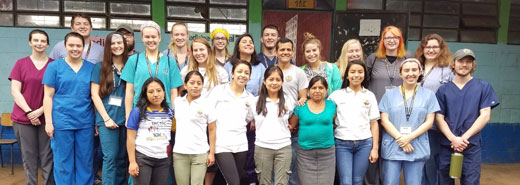
Guatemala 2020 Front: FUNDENOR Leaders, Emma Saunders, Zack Miller; Back: Lauren Funderburg, Vanessa Mahmoud, Connor Glenn, Lexi Wensel, Tyler Lynn, Rebecca Porterfield-Winstead, Samantha Alspaugh, Stephanie Subart, Megan Hite, Brisa Arriaga, Zach Brazel, Williams Picón (FUNDENOR), Ella Machall, Jenna Skeans, Abby Bechtel, Jennifer Wagner
Students are asked on the last night together to reflect on how this experience has changed them. Comments are testimonies of transformation. Many students echoed a comment made by Zach Brazel in the 2020 group, “My personal definition of luxury has changed.” Others reflected on how blessed they now feel and how they will not take their educational opportunity for granted. “At home we are told we should focus on the U.S. first,” said Lexi Wensel. “But I want to help people regardless of where they live. I am more motivated to help people who need it more then we.” Comments covered ethical use of resources and about our U.S. consumerism.
Rebecca Porterfield-Winstead reflected that Maria Luisa’s story changed her perception of what is possible. “Seeing how much people have accomplished with so little has impressed me.” Others reflected on how grateful they now felt for their own educational opportunities. Paul Fry-Miller ’75, a physician assistant, on his 12th trip, shared that he saw privilege in a new light, that of having expectations that don’t take into account how those expectations affect those we have come to help. After hearing these remarks, Mark Shafter concluded, “This gives me hope for the future!”
Osborne recommends that students join a Medical Practicum for the following reasons. “Traveling away from the familiar, yet surrounded by health care professionals, students uniquely learn about health care, other cultures, and themselves. The many compassionate, caring people contributing to these trips provide a safe and healthy way to leave one’s comfort zone and learn in many unanticipated ways.”
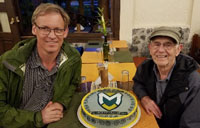
Guatemala 2020, Professor Jeff Osborne
and Professor Emeritus Ed Miller |
85-year-young Ed Miller, who started the Medical Practicum 40 years ago, accompanied the group in January 2020 with his grandson, Zach. At the trip-end celebration dinner, he left the 2020 group with these parting words that his wife, Martha Showalter ’56 Miller, wrote in calligraphy for each student in the past: